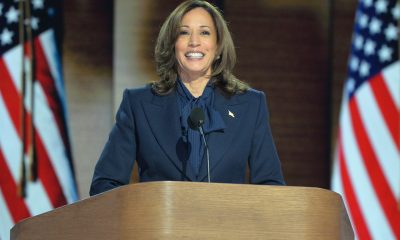National
Jesse Jackson names Rainbow PUSH Coalition successor
White House praised civil rights icon
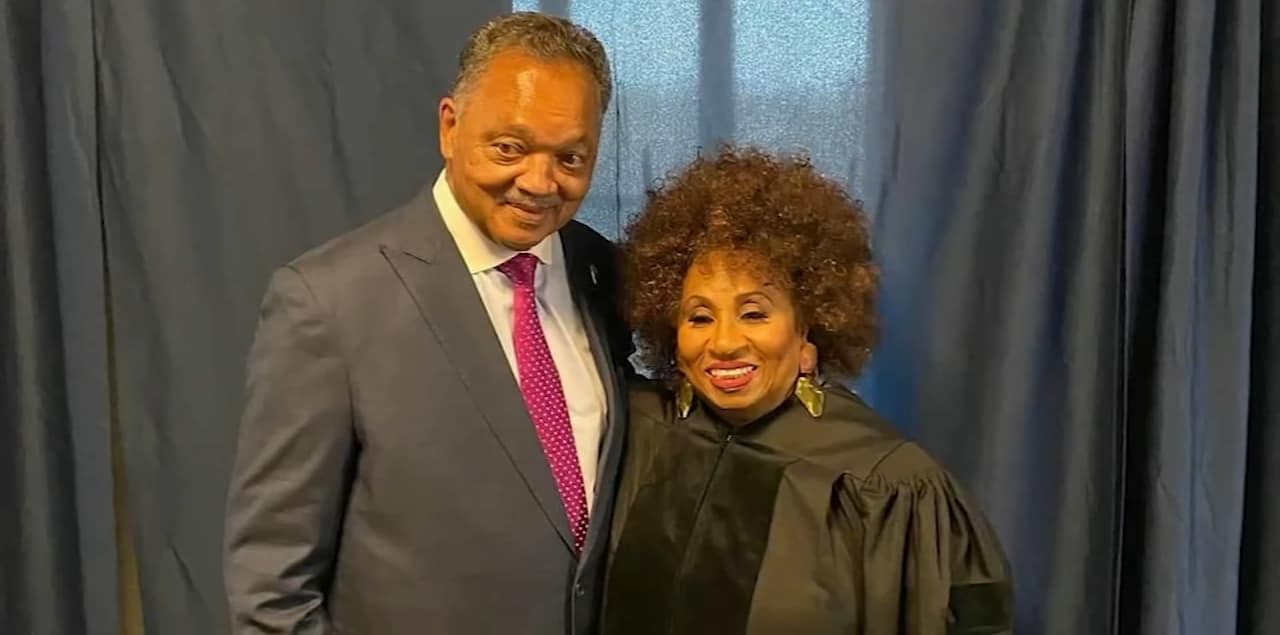
During the annual meeting of the Rainbow PUSH Coalition civil rights organization he founded and has headed for over 5 decades, Rev. Jesse Jackson, Sr., formally named Rev. Dr. Frederick Haynes III of the Friendship West Baptist Church in Dallas as his successor.
The Rainbow PUSH Convention was held on Sunday at the Apostolic Church of God in the Windy City’s Woodlawn neighborhood. Also in attendance was Vice President Kamala Harris, the event’s special keynote speaker, who had arrived at Chicago’s Midway Airport earlier on Sunday morning.
“I am looking forward to this next chapter where I will continue to focus on economic justice, mentorship and teaching ministers how to fight for social justice. I will still be very involved in the organization and am proud that we have chosen Rev. Dr. Haynes as my successor,” Jackson said in a statement released by the organization.
Haynes has served as the senior pastor of Friendship West Baptist for the past four decades.
“Rev. Jackson has been a mentor and I have been greatly influenced and inspired by this game-changing social justice general, international ambassador for human rights, and prophetic genius. Sadly, justice and human rights are under attack in the nation and around the world. The work of Rainbow PUSH is as necessary as ever and I am committed to standing on the shoulders of Rev. Jackson and continuing the fight for freedom, peace, equity, justice and human rights,” Haynes said.
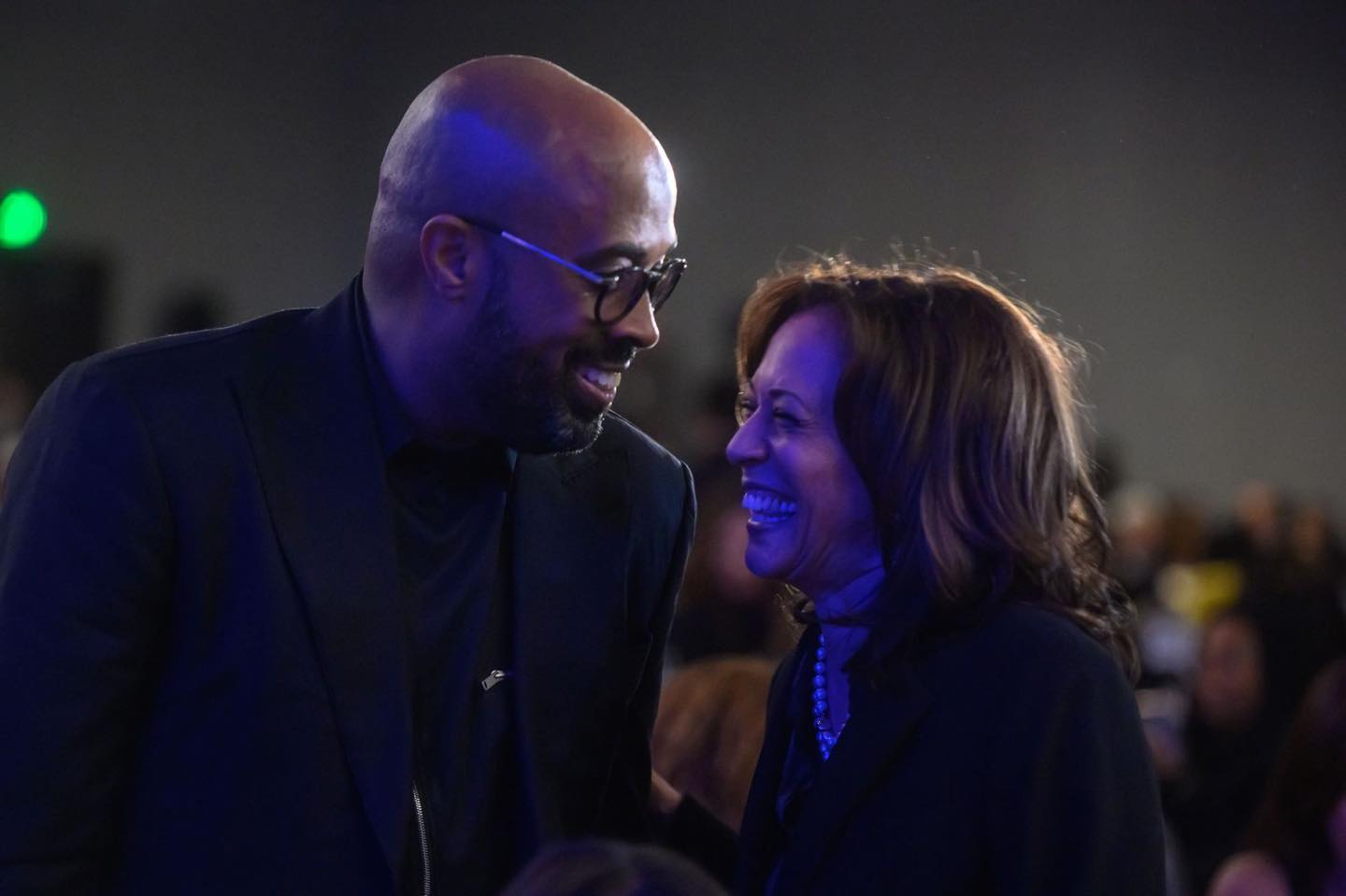
The White House released a statement from President Joe Biden, who has had a longtime working relationship and friendship with the civil rights leader for over 40 years:
“The promise of America is that we are all created equal in the image of God and deserve to be treated equally throughout our lives. While we’ve never fully lived up to that promise, we’ve never fully walked away from it because of extraordinary leaders like Rev. Jesse Jackson, Sr.
“Throughout our decades of friendship and partnership, I’ve seen how Rev. Jackson has helped lead our nation forward through tumult and triumph. Whether on the campaign trail, on the march for equality, or in the room advocating for what is right and just, I’ve seen him as history will remember him: a man of God and of the people; determined, strategic, and unafraid of the work to redeem the soul of our nation.
“Jill and I are grateful to Rev. Jackson for his lifetime of dedicated service and extend our appreciation to the entire Jackson family. We look forward to working with the Rainbow PUSH Coalition as he hands the torch to the next generation of leadership, just as we will continue to cherish the counsel and wisdom that we draw from him.”
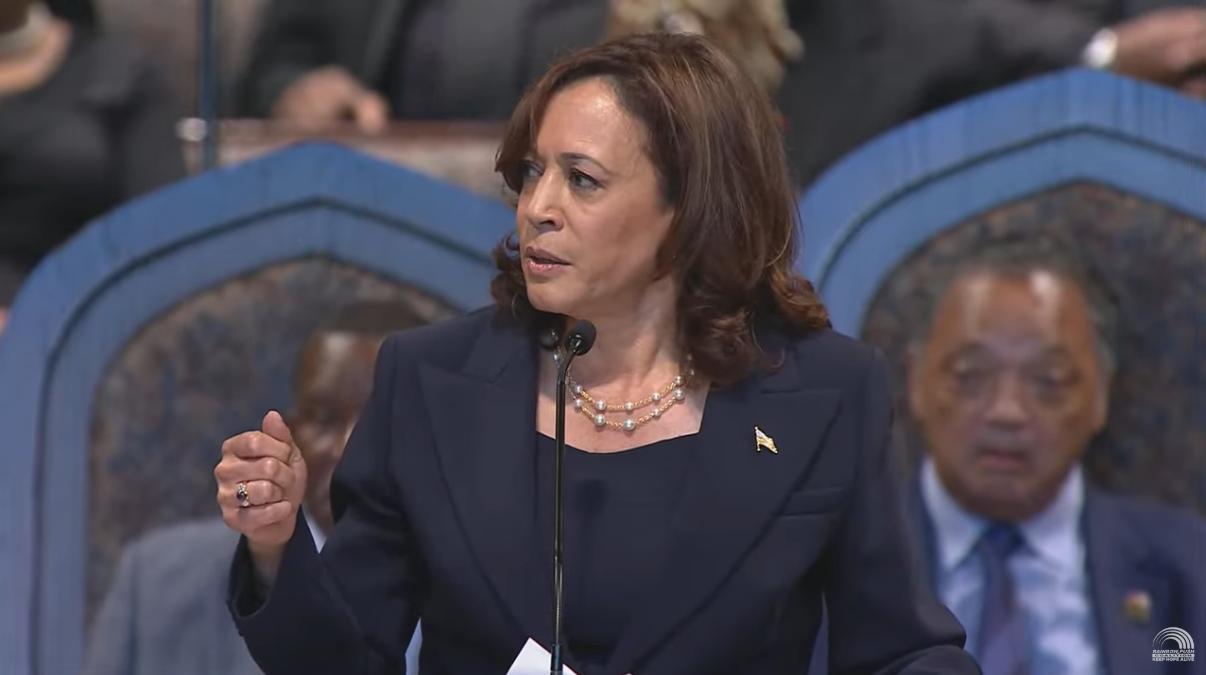
Jacquelyne Germain, political reporter from the Chicago Sun-Times and the pool reporter accompanying the vice president, reported notable quotes made during Harris’ speech included:
“So today, we celebrate one of America’s greatest patriots. Someone who deeply believes in the promise of our country.”
“At the core of Rev.’s work is the belief that the diversity of our nation is not a weakness or an afterthought, but instead, our greatest strength.”
“Early on, he even had the audacity to name this coalition the National Rainbow Coalition.
He defined the rainbow. He was one of the first to define the rainbow. A coalition to push the values of democracy and liberty and equality and justice, not from the top down but from the bottom up and the outside in. He has built coalitions that expanded who has a voice and a seat at the table.”
“Across our country, we are witnessing hard fought hard won freedoms under full on attack by extremist, so called leaders. These extremists have an agenda, an agenda to divide us as a nation, an agenda to attack the importance of diversity and equity and inclusion and the unity of the Rainbow Coalition.”
“These extremists banned books in the year of our Lord 2023. They ban books and prevent the teaching of America’s full history. All the while they refuse reasonable gun safety laws to keep our children safe. Understand what’s happening.”
“Fueled by the love of our country, just as Rev. has done his entire career, let us keep hope alive”
Jackson, 81, was an early supporter and a protégé of the iconic civil rights leader, the late Rev. Dr. Martin Luther King, Jr., starting his work with King participating in the three Selma to Montgomery marches, held in 1965 along the 54-mile highway from Selma, Ala., to the state capital of Montgomery.
King gave Jackson a role in the Southern Christian Leadership Conference (SCLC), sending Jackson to head the Chicago branch of the SCLC’s economic arm, Operation Breadbasket, which he later was appointed president of in 1967.
At 6:01 p.m. on April 4, 1968, King, SCLC leadership, Jackson and other civil rights activists who had gathered at the Lorraine Motel in Memphis, Tenn., to stand in solidarity with striking African American city sanitation workers, were on the balcony outside King’s room 306 when a shot rang out. King was leaning over the balcony railing in front of his room and was speaking with Jackson who was in the parking lot beneath the balcony.
The bullet struck the civil rights leader in his face rendering him unconsciousness and he was rushed to St. Joseph’s Hospital, where doctors opened his chest and performed cardiopulmonary resuscitation. King never regained consciousness and died at 7:05 p.m. whereupon in the aftermath, post-assassination rioting broke out in major cities across the nation.
On April 3, 2018, on the eve of the 50th anniversary of the assassination, Jackson spoke with a reporter from Scripps News about the events of that night:
In the years following the death of King, tensions between Jackson and King’s successor as chairman of the SCLC, Rev. Ralph Abernathy, created a rift that escalated until early December 1971, when Jackson, his entire Breadbasket staff and 30 of the 35 SCLC board members resigned and began planning a new organization which formed the basis for People United to Save Humanity (Operation PUSH) which officially began operations on Dec. 25, 1971, based in Chicago.
In 1984 Jackson organized the Rainbow Coalition and resigned his post as president of Operation PUSH to run for president. He became the second Black American to run a national campaign for president in a major party’s primary.
Twelve years previously in 1972, Shirley Chisholm, a Democratic representative from New York’s 12th Congressional District, centered on Brooklyn’s Bedford–Stuyvesant neighborhood, was the first Black person, male or female, to run for president within a major party, and Chisholm became the first woman to run for the Democratic Party’s presidential nomination.
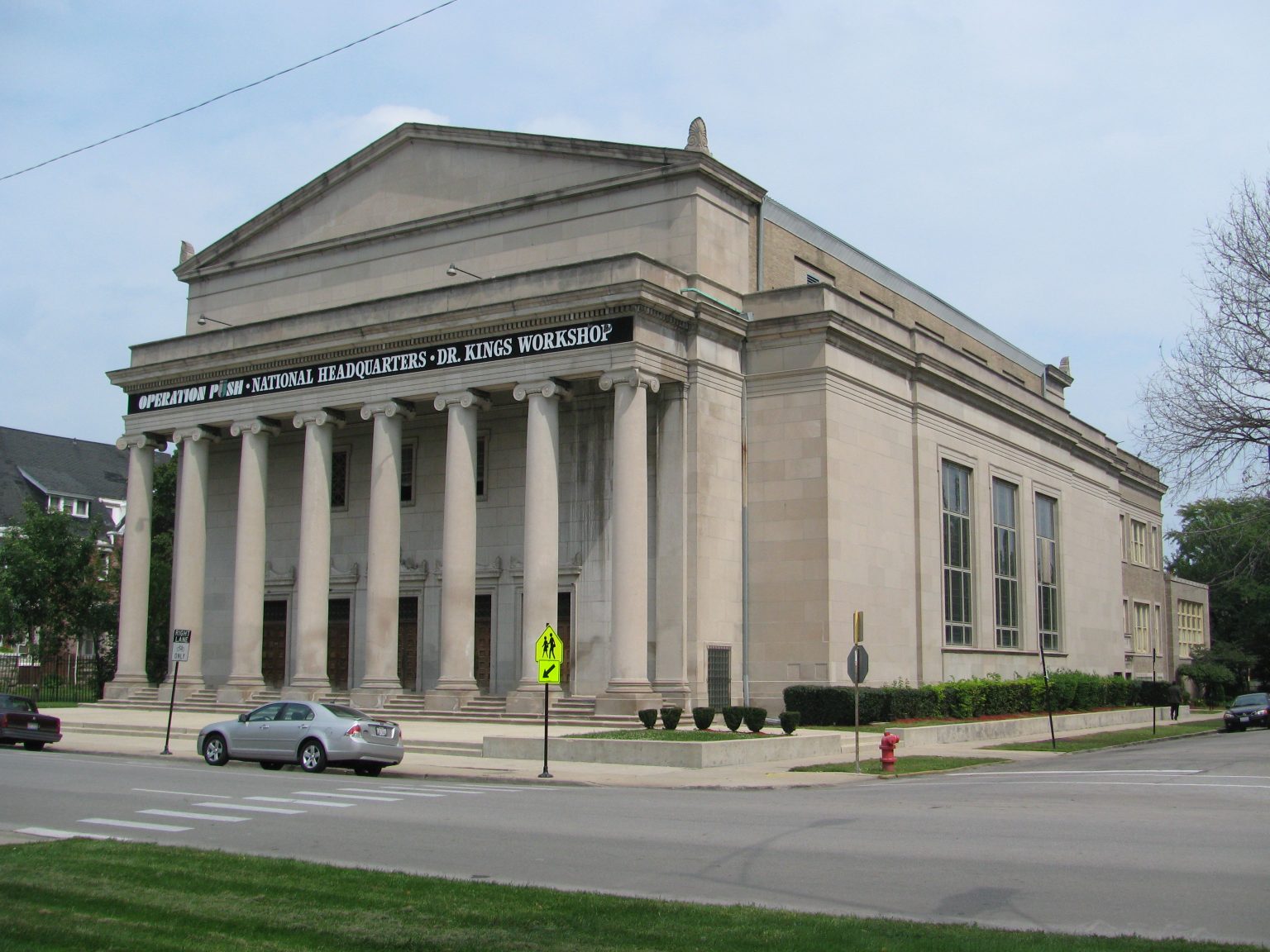
The Democratic primary campaign races for president was a national political watershed moment for the country’s LGBTQ community. It marked the first time that all of the party’s leading candidates had sought the endorsement of LGBTQ organizations.
At the national Democratic convention held at the Moscone Center in San Francisco in 1984, Jackson became the first candidate to deliver a speech to mention gays and lesbians. In what became known as his “Rainbow Coalition” speech, Jackson said:
[…] “Our party is emerging from one of its most hard fought battles for the Democratic Party’s presidential nomination in our history. But our healthy competition should make us better, not bitter. We must use the insight, wisdom, and experience of the late Hubert Humphrey as a balm for the wounds in our party, this nation and the world. We must forgive each other, redeem each other, regroup and move one. Our flag is red, white and blue, but our nation is a rainbow — red, yellow, brown, Black and white — and we’re all precious in God’s sight.
America is not like a blanket — one piece of unbroken cloth, the same color, the same texture, the same size. America is more like a quilt: Many patches, many pieces, many colors, many sizes, all woven and held together by a common thread. The white, the Hispanic, the Black, the Arab, the Jew, the woman, the native American, the small farmer, the businessperson, the environmentalist, the peace activist, the young, the old, the lesbian, the gay and the disabled make up the American quilt.” […]
Jackson decided to make a second run for the presidency in 1987.
On Oct. 11, 1987, at the National March on Washington for Lesbian and Gay Rights, which was thematically honing in on the HIV/AIDS crisis that had enveloped the LGBTQ community, among the speakers at the march rally, held on the grounds of the U.S. Capitol, was presidential candidate Jackson along with gay U.S. Reps. Barney Frank and Gerry Studds, both Democrats from Massachusetts; former National Organization for Women President Eleanor Smeal and United Farm Workers Union President Cesar Chavez.
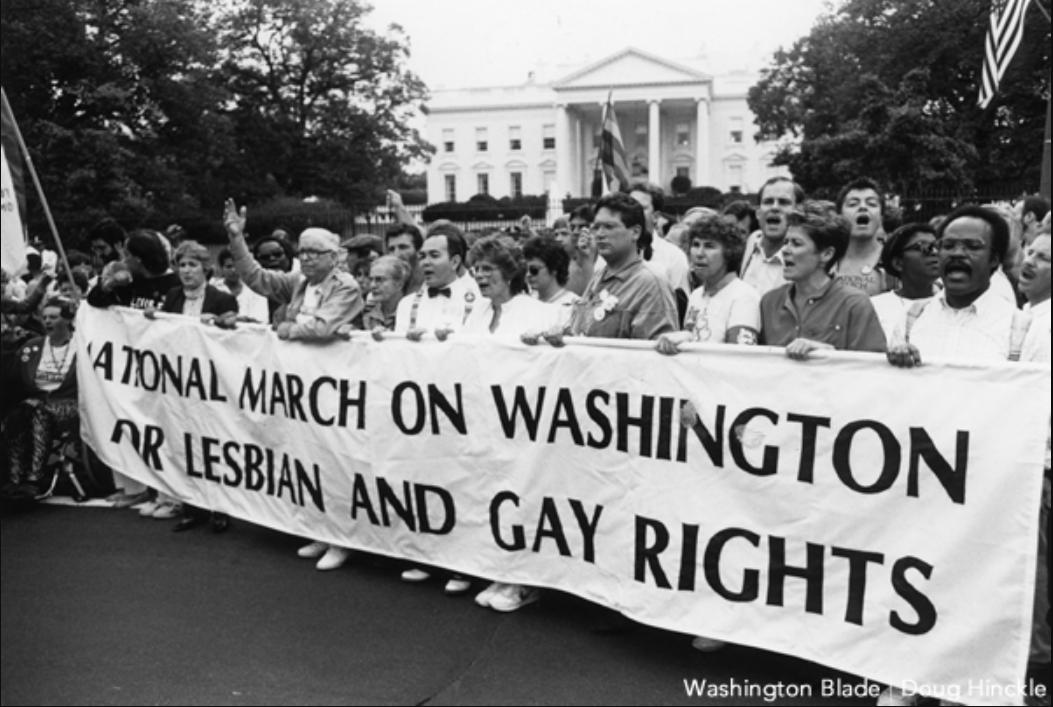
In his remarks, Jackson told the crowd of approximately 300,000:
“We gather today to say that we insist on equal protection under the law for every American, for workers’ rights, women’s rights, for the rights of religious freedom, the rights of individual privacy, for the rights of sexual preference. We come together for the rights of all American people.”
During the 1987 primary campaign, Jackson would often spar with the party’s frontrunner, Massachusetts Gov. Michael Dukakis over the governor’s apparent lack of proactive concern over the HIV/AIDS pandemic that had gripped the LGBTQ community with thousands dying from the disease. Additionally, there were many leaders in the LGBTQ community who viewed Dukakis as homophobic.
Former Washington Post writer Howard Kurtz, in his April 15, 1988, column reported that during a March primary debate, Jackson drew cheers from a vocal gay contingent at the debate when he spoke of the AIDS “hysteria.” Recalling the March on Washington, he said: “I saw people in their wheelchairs who are dying of AIDS . . . Not one of the {Reagan administration} officials would come downstairs and shake their hand.”
Kurtz also noted:
“Dukakis is someone who has gone out of his way to hurt us,” said David Taylor, president of Manhattan’s Gay and Lesbian Independent Democrats, a 400-member club that has endorsed Jackson.
The contest for gay voters is almost a microcosm of the larger campaign: While Jackson moves gays with his eloquent speeches on gay rights, Dukakis takes a more measured approach and finds himself pinned down on specifics from his tenure as governor, Kurtz reported.
After the 1988 campaign, Jackson, now living in D.C., ran for the office of “shadow senator” when the position was created in 1991, serving until 1997, when he did not run for reelection. This unpaid position was primarily a post to lobby for D.C. statehood.
While he declared that he would not be a candidate again for president, he and frontrunner Arkansas Gov. Bill Clinton had a series of public disagreements after Jackson called for the creation of “new democratic majority.”
On April 26, 1992, Jackson and Clinton had a 40-minute meeting and emerged to announce that they were both committed to defeating Bush in the general election. Asked if he was ready to endorse Clinton, Jackson said,
“Well, if he wins the nomination of our party, he would be well on his way. We need a new president and we need a new direction. We cannot afford any more of what George Bush represents,” the New York Times reported.
The National Rainbow Coalition held a leadership conference June 13, 1992, entitled “Rebuild America: 1992 and Beyond,” Jackson and Clinton appearing together spoke about their plans for the future of the U.S.
Over the course of the 1990s Jackson devoted his time and efforts to stemming the rising gun violence, along with efforts to further advance civil rights for the disenfranchised minority communities. He also worked on the campaign for his son Jesse Jackson, Jr., who was elected to the U.S. House of Representatives as congressman from Illinois’s 2nd congressional district who served from 1995 until his resignation in 2012.
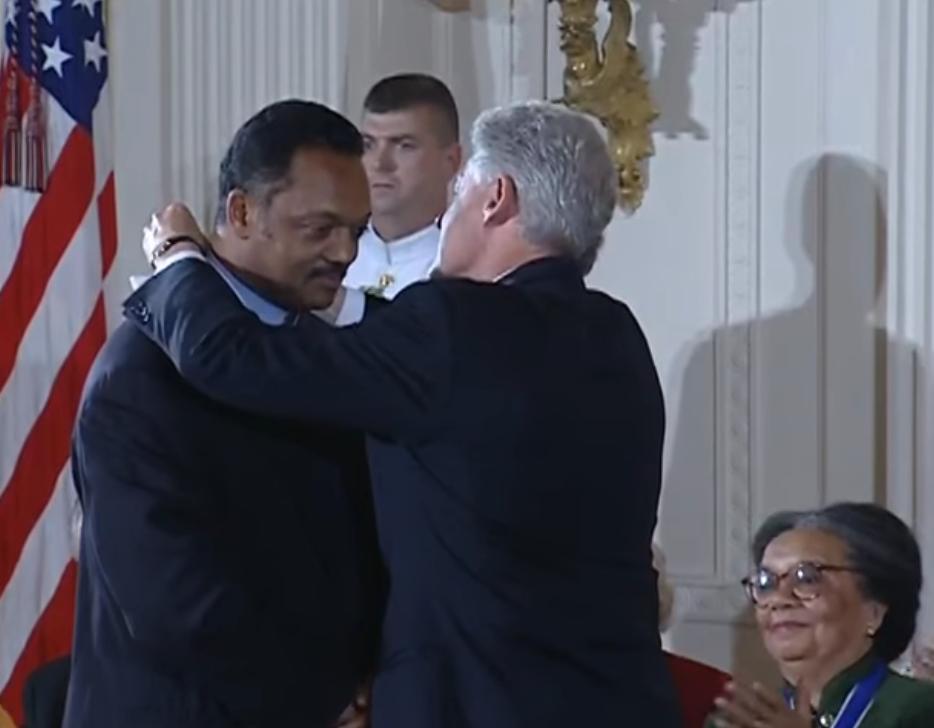
On March 1, 2000, Jackson announced his support of and endorsed Clinton’s vice president, Al Gore, for the latter’s presidential run. After George W. Bush won, Jackson was a vocal opponent of the Bush administration’s policies.
During the course of the rest of the decade Jackson was active in social and cultural issues often being present at numerous protests. One notable incident occurred in November 2006, after a white comedian, former Seinfeld actor Michael Richards launched into onstage racist tirade at the Laugh Factory in Hollywood directed at a Black audience member.
CNN later reported that Richards had called Jackson a few days after the incident to apologize; Jackson accepted Richards’ apology and met with him publicly as a means of resolving the situation. Jackson also joined Black leaders in a call for the elimination of the “N-word” throughout the entertainment industry.
Jackson was an early supporter of then-U.S. Sen. Barack Obama (D-Ill.) who announced his candidacy in 2007 for president. In 2012, he praised then-President Obama for his decision to support same-sex marriage and compared the fight for marriage equality to the fight against slavery and the anti-miscegenation laws that once prevented interracial marriage, a position that brought immediate criticism from conservatives — especially evangelical and Pentecostal Black pastors.
After the infamous shooting death on Feb. 26, 2012, in Sanford, Fla., of 17-year-old Trayvon Martin that brought about a national protests and in which his killer, George Zimmerman was later acquitted under Florida’s so-called ‘stand-your-ground’ law, Jackson refused to accept it, comparing the decision to the acquittals in the cases of Emmett Till and Medgar Evers decades earlier.
In the next few years he would also be vocal about the injustices and deaths of young Black males at the hands of primarily white law enforcement officials.
Jackson continued to actively work on behalf of civil rights causes as exemplified during the administration of President Donald Trump calling out some of the more blatant examples of white supremacy seemingly endorsed by Trump.
As the 2020 election neared, Jackson said that Trump had left “African Americans in the deepest hole with the shortest rope” and predicted “African Americans — and particularly African-American women — will vote overwhelmingly for Joe Biden.”
A few weeks ago, Jackson announced his plans to step down as the leader of Rainbow PUSH, following 64 years of civil rights activity within this movement. Aides said that his decision was brought about in consideration of his advanced age as well as health complications — Jackson was diagnosed with Parkinson’s disease in 2017, and was hospitalized twice in 2021, after testing positive for COVID-19 and then following a head injury.
Related:
Rainbow Push Coalition: Celebration of Rev. Jackson’s life’s work:
The White House
Hundreds protest ICE killing of Renee Nicole Good in D.C.
Married queer woman shot in Minneapolis on Wednesday

Hundreds of people took to the streets of D. C. on Thursday night to protest the killing of a U.S. citizen by a U.S. Immigration and Customs Enforcement agent.
Protests began at the busy — and increasingly queer — intersection of 14th and U Streets, N.W. There, hundreds of people held signs, shouted, and made their way to the White House to voice their dissent over the Trump-Vance administration’s choice to increase law enforcement presence across the country.
The protest, which also occurred simultaneously in cities large and small across the country, comes in the wake of the death of Minneapolis resident Renne Nicole Good at the hands of ICE Agent Jonathan Ross. Good left behind two children and a wife, Rebecca Good.
Records obtained by the Associated Press found that Ross was an Iraq War veteran and nearly two decades into his career with U.S. Border Patrol and ICE.
Good was gunned down just blocks away from where George Floyd was killed by police in 2020, sparking weeks of national protests. Minnesota officials say the FBI has blocked their access to an investigation into the fatal shooting, according to a BBC story published on Friday.
In the nation’s capital, protesters marched from the intersection of 14th and U Street to Lafayette Square, right outside the White House. Multiple D.C. organizations led the protest, most notably Free DC, a nonprofit that works to ensure the right of “self-determination” for District residents, as many local laws can be reviewed, modified, or overturned by Congress. Free DC had organized multiple protests since the Trump-Vance administration was elected.
The Washington Blade spoke to multiple protesters towards the tail end of the protest about why they came out.
Franco Molinari, from Woodbridge, Va., crossed the Potomac to partake in his first-ever protest.
“I don’t appreciate ICE and the use of federal agents being pretty much militarized against America,” Molinari said while holding a “Justice for Renee” sign. “The video of Renee being executed cartel style in her car was enough for me to want to come out, to at least do something.”
Molinari, like many others the Blade spoke with, found out about the protest on Instagram.
“It was my friend there, Sarah … had sent a link regarding the protest to a group chat. I saw it in the morning, and I thought, ‘You know what, after work, I’m head out.’”
He also shared why protesting at the White House was important.
“I already saw the response that the president gave towards the murder of Renee, and it was largely very antagonizing,” Molinari said.
President Donald Trump, along with federal leaders under him, claimed that Good “violently, willfully and viciously ran over the ICE officer.” The president’s claims have been widely discredited through multiple videos of the incident, which show Good was attempting to leave the scene rather than attacking the officer.
“I hope that anybody would be able to see that and see the response and see for themselves that it just is not correct,” Molinari said.
The Blade also spoke with leftist influencer Dave the Viking, who has more than 52,000 followers on TikTok, where he posts anti-fascist and anti-Trump videos.
“We’re out here to make sure that this regime can’t rewrite history in real time, because we all know what we saw … we’re not going to allow them to run with this narrative that they [ICE agents] were stuck in the snow and that that poor woman tried to weaponize her car, because we all saw video footage that proves otherwise,” he told the Blade. “We’re not going to let this regime, the media, or right-wing influencers try to rewrite history in real time and try to convince us we didn’t all see what we know we saw.”
Dave the Viking continued, saying he believes the perceived power of ICE and other law enforcement to act — oftentimes in deadly and unjustifiable ways — is a product of the Trump-Vance administration.
“There’s a line between fascism and anti-fascism. These motherfuckers have been pushing that envelope, trying to label an idea a terrorist organization, to the point of yesterday, crossing that line hardcore. You face the point of looking at history and saying there was this 1989, 2003 America, where we’re just going in, raiding resources. Where is this fucking 1930s Germany, where we’re going in and we’re about to just start clearing shit and pulling knots? Yeah, nope. We proved that shit yesterday.”
Two people were injured in another shooting involving federal agents, this time Border Patrol in Portland, Ore., on Thursday afternoon.
KC Lynch, who lives near American University, also spoke about her choice to protest with a group.
“I came out today because everything that ICE has done is absolutely unacceptable, not only killing this one woman, but also the fact that they’ve been imprisoning people in places that are literally, that have been literally on record by international organizations shown to be human rights violating. It’s unbelievably evil.”
Lynch also echoed Dave’s opinion about parallels between the Trump-Vance administration and the rise of Adolf Hitler in Nazi Germany.
“It’s literally what happened before the Holocaust. We should all be scared. We should all be angry. I’m so angry about it … even talking about it — I’m sorry,” she said before getting choked up.
Lynch emphasized that despite the circumstances in which people were protesting together, the sense of community was strong and powerful.
“I feel like it’s important for people to know that we’re angry, even if no policy changes come out of it, and it’s just nice to yell and be angry about it, because I feel like we’ve probably all been feeling this way, and it’s nice to be around people that are like minded and to like have a sense of community.”
Minnesota
Reports say woman killed by ICE was part of LGBTQ community
Renee Nicole Good shot in Minneapolis on Wednesday

A U.S. Immigration and Customs Enforcement agent shot and killed a woman in Minneapolis as she attempted to drive away from law enforcement during a protest on Wednesday.
The Star Tribune newspaper identified the victim as Renee Nicole Good, 37, a Minneapolis resident who lived blocks from where she was shot in the Central neighborhood, according to reports. Donna Ganger, Good’s mother, told the Star Tribune that her daughter lived in the Twin Cities with her wife.
Multiple videos of the shooting have gone viral on social media, showing various angles of the fatal incident — including footage that shows Good getting into her car and attempting to drive away from law enforcement officers, who had their weapons drawn.
In the videos, ICE agents can be heard telling Good to “get out of the fucking car” as they attempted to arrest her. Good, who press reports say was married to a woman, ended up crashing her car into an electric pole and other vehicles. She was later transported from the scene of the shooting and died at the hospital.
President Donald Trump defended the ICE agent on Truth Social, saying the officer was “viciously” run over — a claim that coincides with Homeland Security Secretary Kristi Noem’s assessment of the situation. Noem, a South Dakota Republican, insisted the officer “fired defensive shots” at Good after she attempted to run over law enforcement agents “in an attempt to kill them — an act of domestic terrorism.”
Multiple state and local officials disputed claims that the shooting was carried out in self-defense at the same time Noem was making those assertions.
An Instagram account that appears to belong to Good describes her as a “poet and writer and wife and mom and shitty guitar strummer from Colorado; experiencing Minneapolis, MN,” accompanied by a rainbow flag emoji.
A video posted to X after the shooting shows a woman, reportedly her wife, sitting on the ground, crying and saying, “They killed my wife. I don’t know what to do.”
“We’ve dreaded this moment since the early stages of this ICE presence in Minneapolis,” Mayor Jacob Frey said during a Wednesday press conference. “Having seen the video myself, I want to tell everybody directly that [the DHS’s claim of self-defense] is bullshit. This was an agent recklessly using power that resulted in somebody dying, getting killed.”
“I have a message for ICE. To ICE, get the fuck out of Minneapolis,” Frey continued. “We do not want you here. Your stated reason for being in this city is to create some kind of safety, and you are doing exactly the opposite. People are being hurt. Families are being ripped apart. Long-term Minneapolis residents that have contributed so greatly to our city, to our culture, to our economy are being terrorized, and now somebody is dead. That’s on you, and it’s also on you to leave.”
Across the Capitol, members of the House and the Senate condemned the actions of the officer.
“There’s no indication she’s a protester, there’s nothing that at least you can see on the video, and therefore nothing that the officers on the ground could see that identify her as someone who’s set out to try to do harm to an ICE officer,” U.S. Sen. Elizabeth Warren (D-Mass.) said Wednesday night on MS NOW’s “The Weeknight.”
“There is no evidence that has been presented to justify this killing,” House Minority Leader Hakeem Jeffries (D-N.Y.) said in a statement on his website. “The masked ICE agent who pulled the trigger should be criminally investigated to the full extent of the law for acting with depraved indifference to human life.”
“ICE just killed someone in Minneapolis,” U.S. Rep. Robert Garcia (D-Calif.) the highest-ranking Democrat on the House Oversight Committee, posted on X. “This administration’s violence against communities across our country is horrific and dangerous. Oversight Democrats are demanding answers on what happened today. We need an investigation immediately.”
In a statement to the Advocate, Human Rights Campaign President Kelley Robinson wrote, “Today, a woman was senselessly killed in Minneapolis during an ICE action — a brutal reminder that this agency and the Trump regime put every community at risk, spreading fear instead of safety. Reports that she may have been part of the LGBTQ+ community underscore how often the most vulnerable pay the highest price.”
National LGBTQ Task Force President Kierra Johnson also responded to Good’s death.
“We recognize and mourn the loss of Renee Nicole Good and extend our condolences to her family, loved ones, and community,” said Johnson in a statement. “This loss of life was preventable and reprehensible, particularly coming at the hands of federal agents.”
National
U.S. in midst of ‘genocidal process against trans people’: study
Attacks rooted in Nazi ideology’s views on gender

Earlier this week, the Lemkin Institute for Genocide Prevention and Human Security issued a haunting warning. Dr. Elisa von Joeden-Forgey, president of the Lemkin Institute, stated that the U.S. is in the “early-to-mid stages of a genocidal process against trans and nonbinary and intersex people.” Dr. Gregory Santon, former president of the International Association of Genocide Scholars, flags “a hardening of categories” surrounding gender in a “totalitarian” way.
Stanton argues that this is rooted in Nazi ideology’s surrounding gender — this same regime that killed many LGBTQIA individuals in the name of a natural “binary.” As Von Joeden-Forgey said, the queer community, alongside other “minority groups, tends to be a kind of canary in the coal mine.”
In his first year in office, Trump and his Cabinet’s anti-trans rhetoric has only intensified, with a report released late September by journalist Ken Klippenstein in which national security officers leaked that the FBI is planning to classify trans people as “extremists.” By classifying trans people as “Nihilistic Violent Extremists,” far-right groups would have more “political (and media) cover,” as Abby Monteil reports for them, for anti-trans violence and legislation.
While the news is terrifying, it’s not unprecedented – the fight against trans rights and classification of trans people as violent extremists was included in Project 2025, and in the past several weeks, far-right leaders’ transphobic campaign has expanded: boycotting Netflix to pressure the platform to remove trans characters, leveraging anti-trans attack ads in the Virginia governor’s race and banning professors from acknowledging that trans people exist. In fact last month, two Republican members of Congress called for the institutionalization of trans people.
It’s a dangerous escalation of transphobic violence that the Human Rights Campaign has classified as an epidemic. According to an Everytown for Gun Safety report published in 2020, the number of trans people murdered in the U.S. almost doubled between 2017 and 2021. According to data released by the Gun Safety report from February 2024, 34 percent of gun homicides of trans, nonbinary, and gender expansive people remain unsolved.
As Tori Cooper, director of Community Engagement for the Transgender Justice Initiative for the Human Rights Campaign Foundation, this violence serves a purpose. “The hate toward transgender and gender expansive community members is fueled by disinformation, rhetoric and ideology that treats our community as political pawns ignoring the fact that we reserve the opportunity to live our lives full without fear of harm or death,” Cooper said.
“The genocidal process,” Von Joeden-Forgey said, “is really about destroying identities, destroying groups through all sorts of means.” And just like the Nazi regime, former genocide researcher Haley Brown said, the Trump administration is fueling conspiracy theories surrounding “cultural Marixsm” — the claim that leftists, feminists, Marxists, and queer people are trying to destroy western civilization. This term, Brown states, was borrowed directly from the Nazi’s conspiracies surrounding “Cultural Bolshevism.”
As Brown explains, historians are just beginning to research the Nazis’ anti-trans violence, but what they are finding reveals a terrifying pattern wherein trans people are stripped of their identification documents, arrested and assaulted, and outright killed.
Before World War II, Germany – especially Berlin – was a hub for transgender communities and culture. In 1919, Dr. Magnus Hirschfield, a Jewish gay sexologist and doctor, founded the Institut für Sexualwissenschaft, the Institute for Sexual Science. The Institute was groundbreaking for offering some of the first modern gender-affirming healthcare, with a trans-affirming clinic and performing some of the first gender-affirming surgeries in the 1930s for trans women Dora Richter and Lili Elbe.
Researchers at the institute coined the term “trassexualism” in 1923, which while outdated now, was the first modern term that Dr. Hirschfield used when working with Berlin police to acquire “transvestite passes” for his patients to help them avoid arrest under public nuisance and decency laws. During the Weimar Republic, trans people could also change their names although their options were limited. In Berlin, queer press flourished after World War I along with a number of clubs welcoming gay, lesbian and trans clientele, including Eldorado, which featured trans performers on stage.
But as Hitler rose to power, trans people were targeted. In 1933, Nazi youth and members of the Sturmabteilung ransacked the institute, stealing and burning books – one of the first book burnings of the Nazi regime. German police stopped recognizing the “transvestite” passes and issuing new ones, and under Paragraph 175, which criminalized sexual relationships with men, trans women (who were misgendered by the police) were arrested and sent to concentration camps.
As the Lemkin Intsitute for Genocide Prevention and Human Security wrote in a statement:
“The Nazis, like other genocidal groups, believed that national strength and existential
power could only be achieved through an imposition of a strict gender binary within the racially pure ‘national community.’ A fundamentalist gender binary was a key feature of Nazi racial politics and genocide.”
History professor Laurie Marhoefer wrote for The Conversation that while trans people were targeted, there was not extensive discussion of them by the regime. But there was evidence of the transphobia behind the regime’s violence, specifically in Hermann Ferdinand Voss’s 1938 book “Ein Beitrag zum Problem des Transvestitismus.”Voss noted that during the Nazi regime, trans people could and were arrested and sent to concentration camps where they underwent forced medical experimentation (including conversion therapy and castration) and died in the gas chambers.
While there is growing recognition that gay, bisexual, and lesbian individuals were targeted during the Holocaust, few know about the trans genocide through which trans individuals were arrested, underwent forced castration and conversion therapy, and were outright killed alongside gay, lesbian, disabled and Jewish individuals in concentration camps. Historians are just beginning to undertake this research, writes Marhoefer, and to delve further into the complex racial hierarchies that affected how trans people were treated.
As Zavier Nunn writes for Past & Present, trans people of “Aryan” racial status and those not considered to be homosexuals were sometimes spared from the worst violence and outright murder. Depending on their skills, they could even be considered for rehabilitation into the Volksgemeinschaft, or Nazi utopian community. As Nunn highlights, trans violence was much more nuanced and individualized and should be explored separately from violence against gay and lesbian individuals during the Holocaust.
Marhoefer’s research of violence against trans women, as recorded in police files (as is the persecution of gay and lesbian individuals), is groundbreaking but rare. He gave a talk at the Museum of Jewish Heritage in 2023, shortly after a 2022 civil lawsuit about denial that trans people were victims of the Holocaust. The German court recognized that trans people were victimized and killed by the Nazi regime, but in the United States, there is still a hesitancy by the wider LGBTQ community and leftist groups to acknowledge that we are living during a time of anti-trans violence, that trans people are being used as political scapegoats in order to distract from real problems of accountability and transparency around government policy.
As anti-trans legislation escalates, it’s important to remember and call out how trans violence is not only a feminist issue, it’s a human rights one as well. While Shannon Fyfe argues that the current campaigns against trans people may not fit the traditional legal definition of a genocide, the destruction and denial of life saving care, access to public spaces, and escalating violence is still immensely devastating.
Kaamya Sharma also notes that the term “genocide” has deep geo-political implications. As she explained, “western organisations are, historically and today, apathetic to the actual lives of people in the Global South, and put moral posturing above Brown and Black lives,” so the choice to use “genocide” is a loaded one. But as the Lemkin Institute for Genocide Prevention and Human Security writes in the same statement: “The ideological constructs of transgender women promoted by gender critical ideologues are particularly genocidal. They share many features in common with other, better known, genocidal ideologies. Transgender women are represented as stealth border crosses who seek to defile the purity of cisgender women, much as Tutsi women were viewed in Hutu Power ideology and Jewish men in Nazi antisemitism.”
Trans people are not extremists, nor are they grooming children or threatening the fabric of American identity – they are human beings for whom (like all of us) gender affirming care is lifesaving. As we remember the trans lives lost decades ago and those lost this year to transphobic violence, knowing this history is the only way to stop its rewriting.
-

 Colombia5 days ago
Colombia5 days agoGay Venezuelan man who fled to Colombia uncertain about homeland’s future
-

 Arts & Entertainment5 days ago
Arts & Entertainment5 days ago2026 Most Eligible LGBTQ Singles nominations
-

 District of Columbia4 days ago
District of Columbia4 days agoKennedy Center renaming triggers backlash
-

 District of Columbia5 days ago
District of Columbia5 days agoNew interim D.C. police chief played lead role in security for WorldPride





